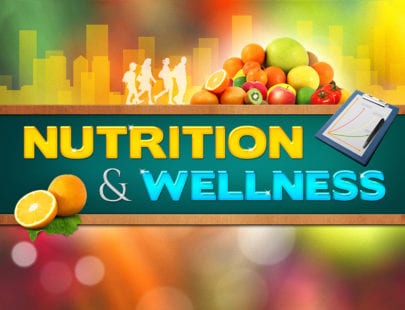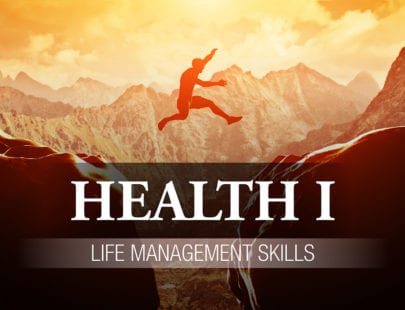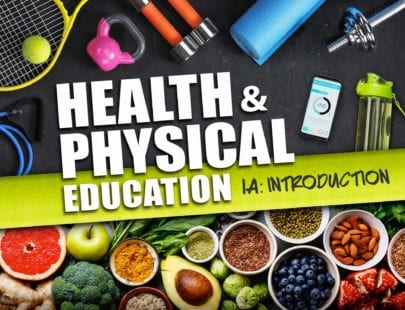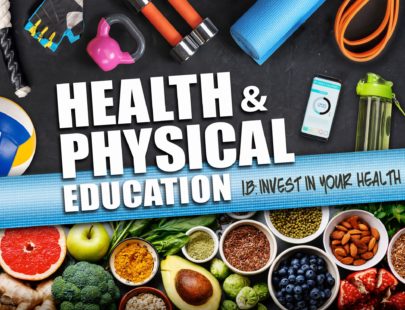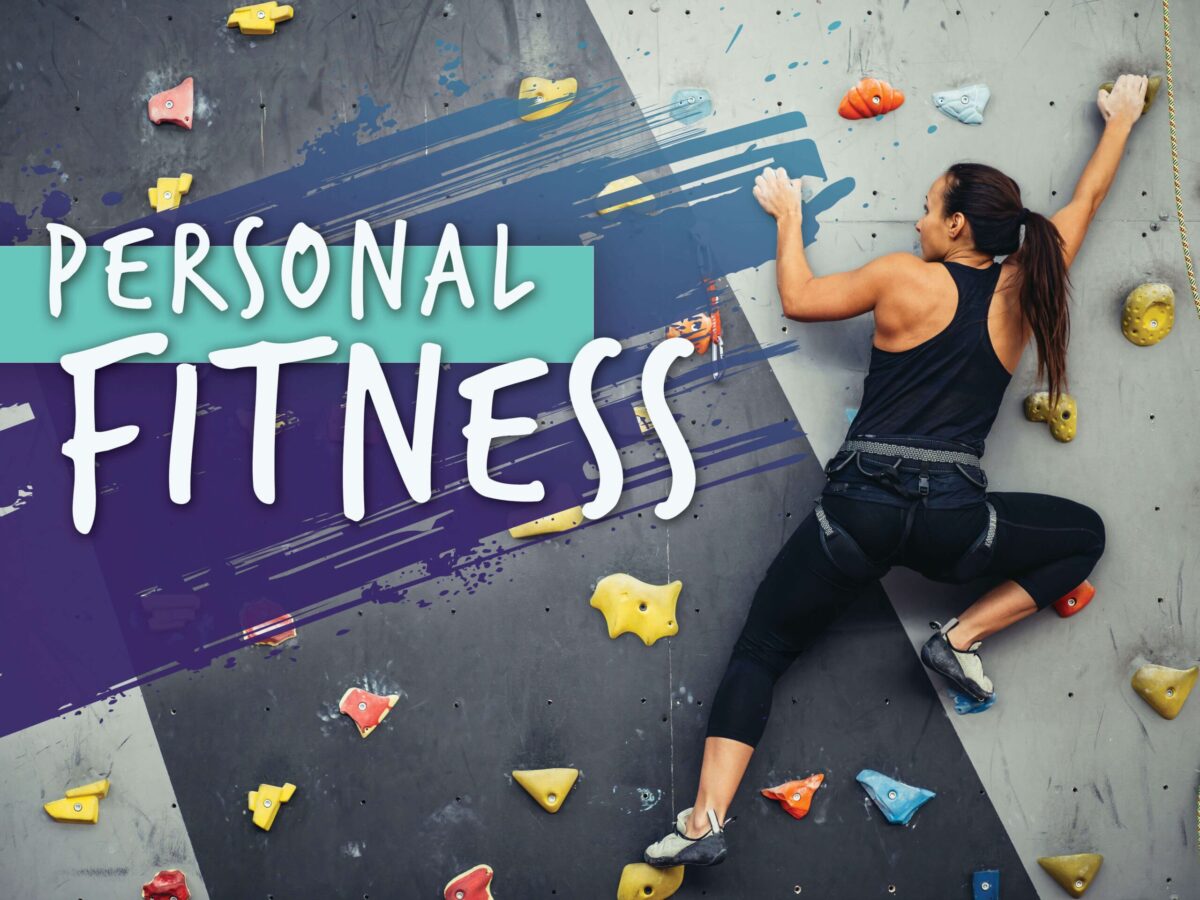
Personal Fitness
Whether you’re a seasoned athlete or a fitness rookie, learning about your health will help you level up! In this course, you will explore your health influences, try out a wide variety of activities, and apply cutting-edge principles of nutrition, safety, and the body in motion to your fitness journey. You will also design your own fitness program based on personal goals with expert guidance so you can put your health plans into action! It’s time to take your personal fitness to the next level!
Units at a Glance
Unit 1: Fitness: Your Personal Journey
If you pay attention to media like TV, outdoor billboards, or social media platforms, you will see and hear people promoting ways to exercise, eat well, and support physical fitness. Many different factors influence our level of personal fitness, and there are various paths to achieving a healthy body. What does fitness look like to you? How can you get to where you want to be in the future? This unit will help you take a look at your own fitness and how it can have a significant effect on your life.
What will you learn in this unit?
- Discuss the broad definition of personal fitness
- Explore factors that influence your attitude about fitness
- Describe detailed components of physical fitness
- Explain what happens in your body during physical activity
Unit 2: Your Fitness, Your Move
The word exercise means simply to use something. You can exercise your rights, your freedom, or your mind. This unit is about helping you exercise your body to be strong and healthy. Physical exercise includes a wide spectrum of activities, offered in a variety of formats and locations. Having so many choices means you can create an ideal physical fitness program that incorporates your skills, personal preferences, and goals. Let’s learn some effective—and fun—exercise options to help you get moving for good health.
What will you learn in this unit?
- Identify types and benefits of cardiovascular exercise activities
- Describe strength training activities, including benefits and risks
- Explain flexibility as a component of your fitness
- Examine exercise activities that emphasize your coordination skills
Unit 3: What Do You Want to Accomplish?
Your fitness journey is most successful when you personalize your goals to match your unique needs. Along the way you must consider your physical requirements and current levels of fitness as much as you consider your own interests and motivators. This unit will guide you through steps to identify your goals so that you can build a successful fitness plan customized just for you.
What will you learn in this unit?
- Explain the process and benefits of goal-setting for health
- Describe methods of assessing your fitness levels to prepare for your goals
- Apply the SMART process to set personal fitness goals
- Discuss ways to remain focused on your goals
Unit 4: Ready to Go?
Yes, you are! By now you have considered various factors you need to create a personal fitness plan. You have thought about what you enjoy and what motivates you. You have explored ways to assess your current fitness levels so that you can recognize your own strengths and weaknesses. You should have a clearly identified macro goal that you want to achieve, as well as ways to reward yourself throughout the process. It is time to get on your way to your health goal by determining each step along the way.
What will you learn in this unit?
- Set your fitness macro goal and create a concrete outline for achievement
- Develop detailed micro goals to guide you through your plan
- Identify ways to manage setbacks when they arise in your fitness program
- Evaluate professional resources to help you reach fitness-related goals
Unit 5: Fuel Up!
If you could have any sports car, what would it be? How would you take care of that car if you owned it? You would not pour vinegar into the gas tank and expect it to perform well on the road. Proper fuel is necessary for successful performance.
Your body is like a sports car. All of your biological systems and organs need the right kind of fuel in order to function and perform the daily tasks you ask of them, from making your bed to competing in a track and field meet. If you challenge your body with physical fitness goals, your fuel becomes even more important for providing energy to support an active lifestyle. This means that a healthy, balanced diet must be part of your personal fitness plan.
What will you learn in this unit?
- Discuss why proper nutrition is vital to your physical fitness
- Identify specific nutrients and foods that benefit your health
- Explain what to seek and avoid in commercial nutrition products and programs
- Research outside resources that can provide help with your nutrition plan
Unit 6: You’re In Charge
Do you want to be healthy and fit? If so, it will be your responsibility to develop and keep habits that promote a fit and healthy lifestyle today and throughout your lifetime. Each choice you make about exercise, rest, nutrition, stress management, and all aspects of physical and social-emotional well-being will affect the outcomes of your fitness goals. Your personal habits can help you feel better or worse, depending on what you choose to do or avoid on a daily basis. By now you should have a plan for exercising and fueling your body with good nutrition. Let’s learn how positive habits and choices can make your personal goals easier to reach.
What will you learn in this unit?
- Explore habits and behaviors that contribute positively to your health
- Describe unhealthy practices to avoid
- Develop tools and strategies to manage your stress
- Examine ways to improve and sustain your mental and emotional health
Unit 7: The Benefits of Teamwork
Organized sports are not just for children. Nor do you need to be a professional athlete to play sports as an adult. People of all ages can find a local team or entire leagues organized around just about any game or physical activity, from traditional sports like soccer, swimming, and softball to newer trends like Spikeball. Many possible choices for team-based sports exist if you want to incorporate these types of group activities into your personal training plan.
What will you learn in this unit?
- Examine fitness and other benefits of joining a sports team
- Explore options for sports teams available to you
- Identify lesser-known sports in the US and globally
- Discuss tactics for successful coaching and team development
Unit 8: You Can Be Fit for Life
You now have the tools for a fit and healthy life, and you have designed a plan to promote your own health habits. Congratulations on this important step! Following your self-designed fitness plan can help you maintain good physical, mental, and social-emotional health for many years. Changing bones, muscles, organs, and hormones—as well as changing life events and schedules—might require you to shift certain aspects of your fitness plan as you get older. Let’s prepare you to care for your changing body and its needs throughout each of life’s stages.
What will you learn in this unit?
- Describe current expectations for your fitness practices in young adulthood
- Discuss family and career-related factors that might affect personal fitness
- Examine how changes in your body might require adjustments to your health and fitness routines
- Evaluate ways to remain fit into older adulthood
Required Materials
Software
- Word processing software
